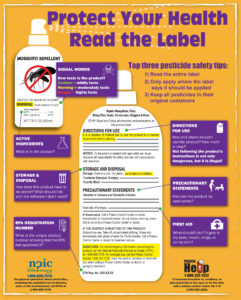Summer is here and many of us in northern New England will be spending more time outside. It’s a busy time for everyone, including the Northern New England Poison Center. During the warmer months, the poison center manages many calls about pesticides, such as insect repellents, often referred to as bug spray.
Insect repellents with DEET can be very effective at preventing bites from mosquitos, ticks and other pests. This can this help you avoid pain and itchiness from bites, and also help prevent diseases such as Lyme. Depending on the amount of DEET in the product, an insect repellent will keep ticks away for two to ten hours, and mosquitoes for two to twelve hours.
Use insect repellents safely by following these steps:
- Read the directions on the product label each time you use it, and follow the directions carefully.
- Do not apply insect repellent over cuts, wounds, or irritated skin.
- Do not apply it near your eyes or mouth.
- Wash the product off with soap and water once you are indoors, and wash treated clothing before you wear it again.
- Call the poison center at 1-800-222-1222 if you spray into eyes or get in mouth, or if you think you are having a bad reaction to DEET.
Take special care with children. Products with a concentration of 30% DEET or less have been shown to be safe for children older than two months. An adult should always apply insect repellents to children. Avoid using the product on children’s hands.
Pesticides include many more products than just insect repellents, though. Common pesticides found in the home include weed killers, ant traps, flea treatments, rat poison and disinfectants. Every product classified as a pesticide is required to give standard information on the label. Click on the graphic to the right for a guide to reading a pesticide label.
Here are some general tips for using pesticides safely:
- Read and carefully follow the directions on the pesticide label for use, safety, storage and disposal. Read the label each time you use the product.
- Use pesticides in a well-ventilated area and keep kids and pets away during application.
- Never use an outdoor-use pesticides indoors.
- Store all pesticides out of reach of children and pets.
- Keep pesticides in their original labeled containers, and store them separately from food, drinks, medications and other products.
- If you have pesticides you no longer need, be sure to dispose of them properly. Call your town office or local waste facility to find out the best way to get rid of these products in your community.
If someone swallows or inhales a pesticide, or gets one in their eyes or on their skin, call the poison center at 1-800-222-1222, chat online or text POISON to 85511. The poison center is available 24/7, and all calls are free and confidential.
For general questions about the choosing, storing or using pesticides, call the National Pesticide Information Center at 1-800-858-7378 or visit npic.orst.edu.
Crossposted with the UVM Medical Center blog.





